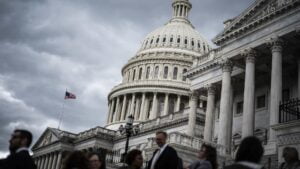The debate over whether Chinese-owned TikTok can operate in the U.S. is back in the spotlight, shedding light on the risks for Chinese stocks in a U.S. presidential election year. The House of Representatives recently passed legislation focused on TikTok, and now the committee behind that bill is targeting Chinese biotech companies with another proposed bill. As tensions between the U.S. and China continue to fluctuate, Goldman Sachs analysts have updated their model to measure the level of risk in Chinese stocks.
According to Goldman Sachs, their revised U.S.-China tensions barometer currently stands at 53 out of 100, suggesting a somewhat benign outlook for the bilateral relationship. Despite some improvements in geopolitical factors, other risks are on the rise, particularly in the “Soft Tech” sector. Market volatility and proposed bills like the BioSecure Act are contributing to the increased risks in the tech industry.
The TikTok legislation, which effectively bans the app in the U.S. unless its Chinese parent company sells it, has already passed in the House and is now moving to the Senate. Analysts predict that its momentum may slow in the Senate due to concerns about specificity and larger policy restrictions. However, investors are still preparing to potentially purchase the popular app if it becomes available for sale.
Former Treasury Secretary Steven Mnuchin has expressed support for the TikTok legislation and is working to assemble a group to buy the app. The tough stance on China has become a bipartisan agreement, with both the Trump and Biden administrations taking steps to restrict Chinese businesses’ access to certain technologies.
Goldman Sachs analysts have highlighted specific Chinese stocks and sectors that tend to outperform or underperform based on the level of tensions between the U.S. and China. Healthcare companies, postal banks, and alcohol companies in China are among those that tend to perform well during times of heightened tensions, while consumer sectors generally see positive outcomes. On the other hand, capital goods, tech hardware, and semiconductors tend to outperform during periods of de-escalation.
Overall, the outcomes of the U.S. presidential election will have significant impacts on asset markets globally, U.S.-China relations, and the returns of Chinese equities. Investors should stay informed and consider adjusting their portfolios accordingly to navigate the shifting landscape of U.S.-China tensions.
Source link

